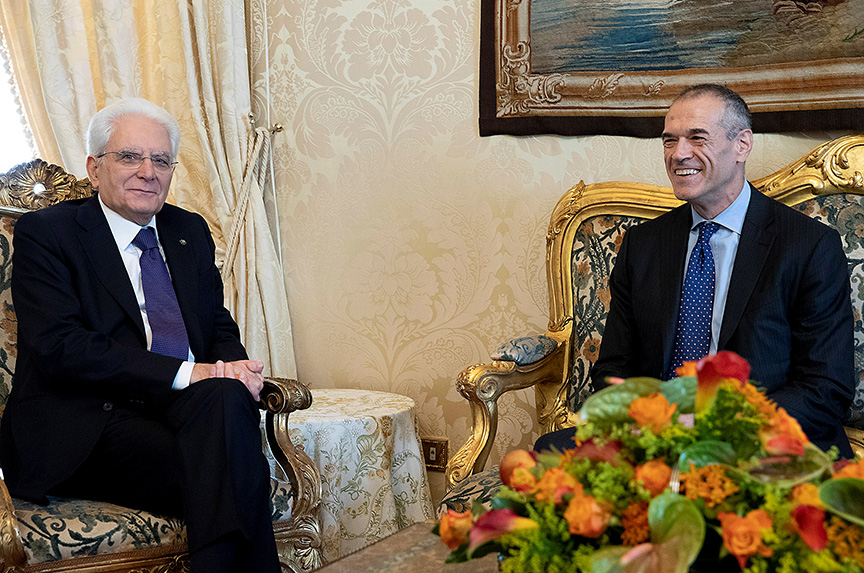 Italy is, not for the first time, in political crisis. But this time, what happens in Rome could have a big impact on financial markets, the euro, and the longer-term future of the European Union as a whole.
Italy is, not for the first time, in political crisis. But this time, what happens in Rome could have a big impact on financial markets, the euro, and the longer-term future of the European Union as a whole.
Sergio Mattarella, the country’s largely ceremonial president, took the unusual step on May 28 of vetoing a candidate for finance minister: Paolo Savona, an economist who considers the euro an instrument of German imperialism. Savona once wrote a plan for how Italy could “secretly” leave the single currency.
Mattarella feared—not unreasonably—that Savona’s appointment could trigger a market panic. Italian borrowing costs were already rising as it became clear that the populist Five Star Movement and far-right League were on the verge of doing a deal. With Italy’s debt at 130 percent of GDP, it can ill afford higher interest rates.
But Mattarella pays a high price for his intervention. Rather than find another candidate, the Five Star and League, which won the election in March, returned their mandate and accused the president of overturning the will of the people.
Most of the Italian news media as well as the two mainstream political parties—the center-left Democrats and Silvio Berlusconi’s right-wing Forza Italia—have defended Mattarella’s decision, but this only feeds into the Five Star/League narrative of the people versus the elites. It’s a familiar story in Europe and around the world: a populist movement is fighting what it sees as entrenched globalist power, while from the other end of the telescope it looks like a dangerous attempt to destabilize critical institutions.
The Five Star has maintained its support in the polls. The League is up, growing at the expense of its erstwhile partner, Berlusconi. The two parties could easily win another election, this time fought explicitly on the question of Italy’s euro membership.
Five Star leader Luigi Di Maio has called for mass demonstrations on June 2, Republic Day. His party is preparing legislation to impeach Mattarella. That is unlikely to succeed. Removing a president requires not only majorities in both houses of parliament but the support of the Constitutional Court. It is hard to imagine it ruling against Mattarella when he was within his rights to reject Savona.
Impeachment proceedings will be a publicity boon for the Five Star and League, though, and that is how their over-the-top rhetoric must be understood. Both are hoping to come out of this stronger. The Five Star, which holds left-wing economic views, is hoping to win a majority on its own. The League, which allies in Europe with France’s far-right National Front, would be more comfortable ruling in a coalition with Berlusconi’s and other right-wing parties. The two now seek to out-populist each other.
Italy won’t have a populist government – for now. In the interim, Italy will be governed by technocrats. Mattarella has asked Carlo Cottarelli, a former International Monetary Fund (IMF) official, to put together a cabinet. On the off chance that it will win a confidence vote in parliament, the plan is for it to rule until December, enabling it to pass a budget for next year. In the more likely event that it will be voted down, the government will stay in a caretaker capacity over the summer with new elections due in August.
Italy’s political issues are in some ways very local, the product of its own broken party system. But the European Union is confronting similar tensions elsewhere, and markets are nervous about political risk. Italy is a founding member of the EU and the third largest economy in the Eurozone. Memories of the Greek crisis are still fresh. It’s too early to talk about a rerun, and Greece isn’t Italy – but the way that Italy handles the next few weeks will be watched very closely by financial markets and Italy’s European allies alike.
Nick Ottens is the founder and chief editor of the transatlantic opinion website Atlantic Sentinel. Follow him on Twitter @NickOttens.
Image: A woman walked past electoral posters in Pomigliano D'Arco, near Naples, Italy, on February 21. Italians will vote in a parliamentary election on March 4 that is being closely watched on both sides of the Atlantic. (Reuters/Alessandro Bianchi)
